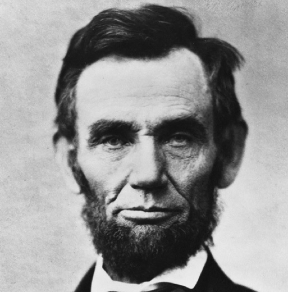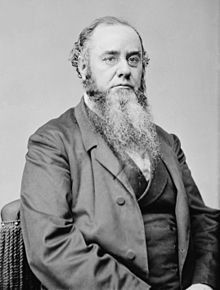 President Lincoln believed in keeping his friends close, but also new that sometimes it was the best policy, to keep his enemies closer. When Lincoln was elected President in 1860, he knew that the most important of his duties was to select a cabinet, that would hold the country together during the civil discontent to come. The varying abilities and assets of these appointees, were often at odds and created an infighting that tried Lincoln’s patience to the breaking point. One of the most contentious of these cabinet members was Edwin M. Stanton, Secretary of War. The President had an innate wisdom in his judgement of character and he realized that Stanton had the intelligence and tenaciousness to assume the overwhelming responsibilities of the office.
President Lincoln believed in keeping his friends close, but also new that sometimes it was the best policy, to keep his enemies closer. When Lincoln was elected President in 1860, he knew that the most important of his duties was to select a cabinet, that would hold the country together during the civil discontent to come. The varying abilities and assets of these appointees, were often at odds and created an infighting that tried Lincoln’s patience to the breaking point. One of the most contentious of these cabinet members was Edwin M. Stanton, Secretary of War. The President had an innate wisdom in his judgement of character and he realized that Stanton had the intelligence and tenaciousness to assume the overwhelming responsibilities of the office.
Edwin M. Stanton, was a career lawyer, politician and abolitionist Democrat. He had briefly held a cabinet post in the administration of President James Buchanan and when Lincoln began assembling his cabinet, he insisted that Stanton accept the position as Secretary of War. The President had it on good authority, that his new War Minister had stayed in contact with Buchanan and berated Lincoln vehemently and insinuated that the nation would soon be swamped by Jefferson Davis and other southern intrigues. In addition, Stanton intimated that the government would be overthrown and General McClellan would be crowned the Military Dictator of the nation.
 Lincoln recognized that most of the rumor and innuendo concerning Stanton’s allegiance was merely Democratic Party bluster. However Lincoln’s philosophy of, keeping his friends close and his enemies closer, allowed the President to intimately observe the War Secretary and his day-to-day administration of his department. Secretary Stanton became a renowned demon and no-nonsense task master of military affairs. He had little compassion for malingerers of any stripe and could not abide the hordes of contract seekers that plagued the administration. Secretary Stanton maintained a cadre of influential spies and informants that kept him current on military intelligence, political strategies and peer performance. Secretary of War, Edwin M. Stanton was in essence the official Commander-in-Chief of all the armies and naval forces of the United States Government, at least in his own mind. Lincoln was aware of Stanton’s self-importance, but the President also knew that the country’s best interests were being well handled by the Secretary and that superseded all peripheral shortcomings.
Lincoln recognized that most of the rumor and innuendo concerning Stanton’s allegiance was merely Democratic Party bluster. However Lincoln’s philosophy of, keeping his friends close and his enemies closer, allowed the President to intimately observe the War Secretary and his day-to-day administration of his department. Secretary Stanton became a renowned demon and no-nonsense task master of military affairs. He had little compassion for malingerers of any stripe and could not abide the hordes of contract seekers that plagued the administration. Secretary Stanton maintained a cadre of influential spies and informants that kept him current on military intelligence, political strategies and peer performance. Secretary of War, Edwin M. Stanton was in essence the official Commander-in-Chief of all the armies and naval forces of the United States Government, at least in his own mind. Lincoln was aware of Stanton’s self-importance, but the President also knew that the country’s best interests were being well handled by the Secretary and that superseded all peripheral shortcomings.
President Lincoln praised and respected Stanton’s position stating,
“He is the rock on the beach of our national ocean against which the breakers dash and roar, dash and roar without ceasing. He fights back the angry waters and prevents them from undermining and overwhelming the land. Gentlemen, I do not see how he survives, why he is not crushed and torn to pieces. Without him I should be destroyed.”
Edwin M. Stanton’s opinion of Lincoln had also changed. After the President’s assasination, the Secretary of War looked at Lincoln’s lifeless body and lamented,
“Now he belongs to the ages.” There lies the most perfect ruler of men the world has ever seen.”
One of Abraham Lincoln’s best policies was how the President kept his friends close and his enemies closer.
Bummer


I’ve always thought that Lincoln brought Stanton into his cabinet because he was impressed with the man’s ability and knew he had to get rid of the corrupt Simon Cameron at the War Department. By that point he saw how badly the war was being run and was determined to make all necessary changes to turn things around. I agree, he knew Stanton was not a fan of his but he also knew he didn’t care as long as he could get results. Once again Lincoln’s wisdom was greater than most knew until he was gone.
Louis,
You’re correct, Cameron was running an inept department and Lincoln soon replaced him. Lincoln, however, was well aware of Stanton’s misplaced loyalties and decided to over look them, for the no-nonsense, tenacious, omnipotent and micro-management philosophy that the “bearded one” displayed. Only the President could over-rule a Stantonism. Which he did on many occasions. Lincoln’s philosophy of “keeping enemies closer” won out in the long run, as Stanton and Lincoln developed a mutual respect and admiration for each other.
Bummer